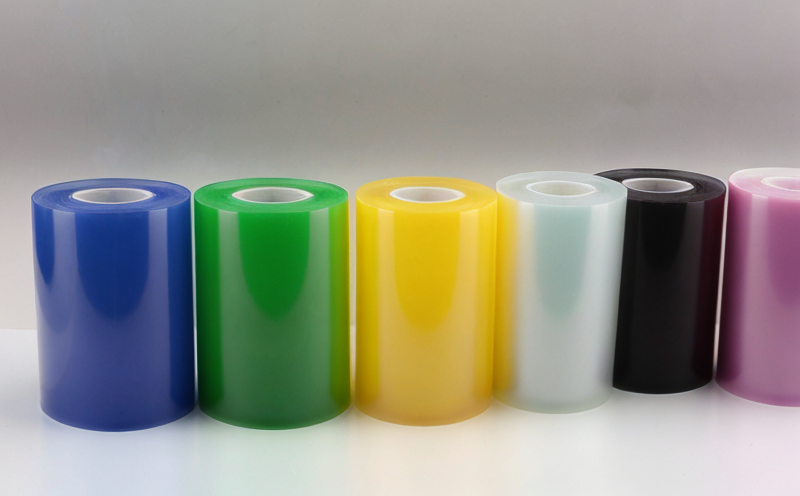EN 13432 Compostability Testing of Plastic Films
The European standard EN 13432 is a stringent certification for the compostability of plastic packaging and films. Compliance with this standard ensures that products are biodegradable under industrial composting conditions, thus reducing their environmental impact. This service offers comprehensive testing to validate compliance with EN 13432 standards.
The process involves several key steps, each critical for ensuring accurate results:
- Sample Preparation: Specimens are cut into standard shapes and sizes to ensure uniformity across tests.
- Composting Conditions: Samples are incubated in controlled composting environments that mimic industrial composting conditions as specified by the standard.
- Biodegradation Measurement: The extent of biodegradation is quantified through weight loss and carbon dioxide production analysis. This data helps determine if the material meets the required 90% biodegradation within six months under defined conditions.
- Heavy Metal Release: Testing ensures that no harmful heavy metals are leached into compost, which could contaminate soil or water.
- Nutrient Release: The quality of the nutrient release is also evaluated to ensure it contributes positively to the composting process.
Our laboratory uses state-of-the-art equipment and follows international standards like ISO 17025 to provide accurate and reliable testing results. This service is essential for companies looking to innovate in sustainable packaging solutions, ensuring they meet regulatory requirements while contributing to environmental conservation efforts.
The importance of this test cannot be overstated, especially as the demand for eco-friendly products continues to grow. Compliance with EN 13432 not only enhances a company's reputation but also opens up new market opportunities in sectors like agriculture and waste management.
Scope and Methodology
The scope of the EN 13432 compostability test encompasses the evaluation of plastic films under industrial composting conditions. The methodology involves several critical steps to ensure accurate results:
- Sample Preparation: Each specimen is cut into a standard 10 cm x 10 cm square, which ensures uniformity and comparability across tests.
- Composting Conditions: Samples are incubated in an industrial composting environment at temperatures between 58°C to 60°C for a period of 93 days. This temperature range is crucial as it simulates the conditions found in commercial compost facilities.
- Biodegradation Measurement: The extent of biodegradation is determined by measuring weight loss and carbon dioxide production. Samples that meet or exceed 90% biodegradation within six months are considered compliant with EN 13432.
- Heavy Metal Release: Testing for heavy metals ensures that the composting process does not introduce harmful substances into the environment. This is critical to maintaining soil and water quality.
- Nutrient Release: The quality of nutrient release is also evaluated, ensuring that the decomposed material contributes beneficial nutrients to the compost.
The methodology adheres strictly to international standards such as ISO 17025, ensuring the highest level of accuracy and reliability. Our laboratory employs advanced equipment and methodologies to ensure compliance with all specified criteria.
Benefits
Compliance with EN 13432 offers numerous benefits for businesses in the polymer & plastics sector, particularly those focused on developing sustainable packaging solutions. These include:
- Regulatory Compliance: Ensures that products meet stringent environmental standards, thereby avoiding legal penalties and fines.
- Enhanced Reputation: Demonstrates a commitment to sustainability, which is increasingly important for consumer perception and brand loyalty.
- Market Expansion: Opens up new market opportunities in sectors like agriculture and waste management, where there is growing demand for biodegradable materials.
- Innovation Incentive: Encourages R&D efforts towards more sustainable product development.
- Cost Savings: Reduces long-term environmental liabilities by ensuring products do not contribute to landfill waste.
- Purchase Decision Influence: Helps procurement teams make informed decisions about materials that are truly sustainable and environmentally friendly.
- Educational Value: Provides valuable insights into the composting process, helping companies better understand how their products interact with natural environments.
By offering this service, we not only assist in meeting regulatory requirements but also contribute to a more sustainable future by promoting responsible product development.
Industry Applications
- Agriculture: Biodegradable films can be used for mulching and soil covering, enhancing crop growth while reducing waste.
- Waste Management: Compostable packaging reduces the volume of non-degradable materials in landfills, promoting a circular economy.
- Packaging Industry: Companies developing sustainable packaging solutions benefit from this testing to ensure their products meet environmental standards.
- R&D: Researchers and developers in polymer & plastics can use these tests to innovate more environmentally friendly materials.
- Procurement: Purchasing departments can rely on this testing to select suppliers who adhere to sustainable practices, ensuring compliance with corporate sustainability goals.
The versatility of these films across various industries underscores the importance and wide-ranging impact of EN 13432 compliance.





